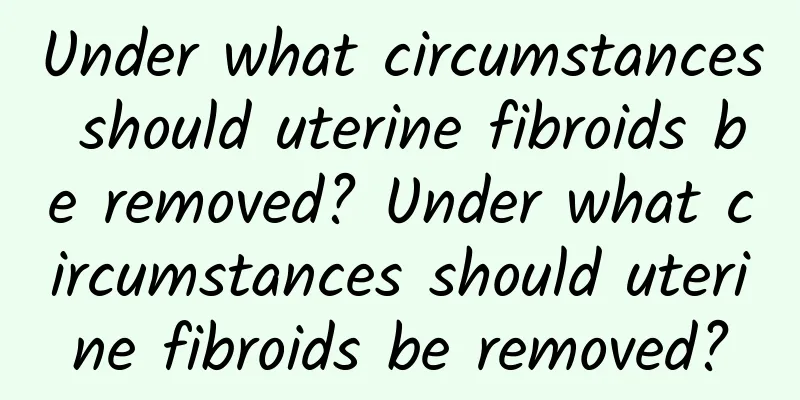What should be paid attention to for benign uterine fibroids? Do benign uterine fibroids need to be removed?

|
What should be paid attention to for benign uterine fibroids? Do benign uterine fibroids need to be removed? Uterine fibroids are one of the most common benign tumors in women. They usually grow in the uterine muscle wall and are nodules composed of smooth muscle cells. Most uterine fibroids are benign, but sometimes they can develop into malignant tumors. For benign uterine fibroids, patients should pay attention to the following points and choose whether to remove them according to the specific situation. First of all, for women with benign uterine fibroids, regular gynecological examinations are very important. Through regular physical examinations, the growth of uterine fibroids can be detected in time, as well as whether there are signs of malignant transformation. Gynecologists will use palpation or ultrasound to determine the size, location and nature of the tumor. Only by conducting regular examinations can the situation of uterine fibroids be grasped in time and appropriate treatment measures can be taken. Secondly, women with benign uterine fibroids should have their blood estrogen levels checked regularly. Changes in hormone levels may affect the growth of uterine fibroids. If estrogen levels are high, uterine fibroids may grow larger and symptoms may occur. Therefore, regularly checking hormone levels can help patients detect and control the growth of uterine fibroids early. In addition, patients with benign uterine fibroids should also pay attention to their eating habits. A diet high in fat, cholesterol, and salt may increase the risk of uterine fibroids. Therefore, patients should avoid eating too much fried food, desserts, and high-salt foods. Instead, they should choose a healthy diet, including more vegetables, fruits, and whole grains, and less processed foods and sugary drinks. For benign uterine fibroids, whether or not they need to be removed depends on the condition and the patient's needs. For small fibroids that do not cause symptoms, doctors usually recommend an observation strategy. This means regular gynecological examinations and monitoring the growth of the fibroids. If the fibroids are not enlarged and causing symptoms, then removal surgery may not be necessary. However, if the fibroids are large or symptoms occur, such as abnormal bleeding, pelvic pain, etc., then the doctor may recommend removal surgery. In summary, women with benign uterine fibroids should undergo regular gynecological examinations to monitor the growth of the fibroids. At the same time, they should also pay attention to their eating habits and avoid eating high-fat, high-cholesterol and high-salt foods. For small fibroids without symptoms, an observation strategy can be chosen, while for larger or symptomatic fibroids, resection surgery may need to be considered. Through scientific and reasonable management of benign uterine fibroids, the quality of life and health level of patients can be improved. In the popular science introduction section, you can briefly introduce the general situation of uterine fibroids. For example, uterine fibroids are one of the most common benign tumors of the female reproductive system, affecting the health of many women. It usually occurs in women of childbearing age and rarely occurs after menopause. In addition, the specific cause of uterine fibroids is still unclear, but estrogen and progesterone are believed to be related to their occurrence. If the growth of uterine fibroids is not controlled, it may cause symptoms such as irregular menstruation, anemia, pelvic pain, compression of the bladder and rectum, and may even affect fertility in severe cases. Therefore, it is very important to understand and know about uterine fibroids as early as possible. |
<<: What is the best way to remove uterine fibroids? How to remove uterine fibroids
Recommend
Experts explain how to properly care for vulvar leukoplakia
The care of vulvar leukoplakia is a topic of conc...
unexpected! Drinking beer can cool you down and beautify your skin
The summer is hot and the temperature is hitting ...
What are the ways to prevent endometriosis?
Endometriosis is a disease known as a devil. Mens...
KO weight loss plateau! 3 actions to increase your basal metabolic rate
I believe that many people who are losing weight ...
【Video】Why can’t I lose weight? It turns out that eating these things messes up hormones
The reason why you can’t lose weight may be that ...
What should I pay attention to after being discharged from hospital for pelvic inflammatory disease?
After patients have undergone pelvic inflammatory...
TCM's understanding of the causes of ectopic pregnancy
According to the four examinations and eight prin...
Causes of adenomyosis
The occurrence of adenomyosis is mainly related t...
How much does one injection of Dafilin cost?
The price of a shot of Diphereline is usually the...
What are the complications of irregular menstruation?
There are many causes of irregular menstruation, ...
What are the commonly used methods for diagnosing vulvar leukoplakia in women?
Itching, dry skin, thickening and whitening of fe...
Can painless abortion cause ovarian cysts?
Painless abortion surgery is accompanied by many ...
How to treat multiple uterine fibroids? Will multiple uterine fibroids cause infertility?
Different types of uterine fibroids can occur sim...
Bacterial vaginosis is the most annoying thing for women
We are exposed to bacteria every day. Too much ba...
Yang Mi lost weight after giving birth, her secret weapon is... Famous weight loss doctor: Be careful to detonate these four landmines in 5555 weight loss
Blind destruction? You can quickly lose weight to...









